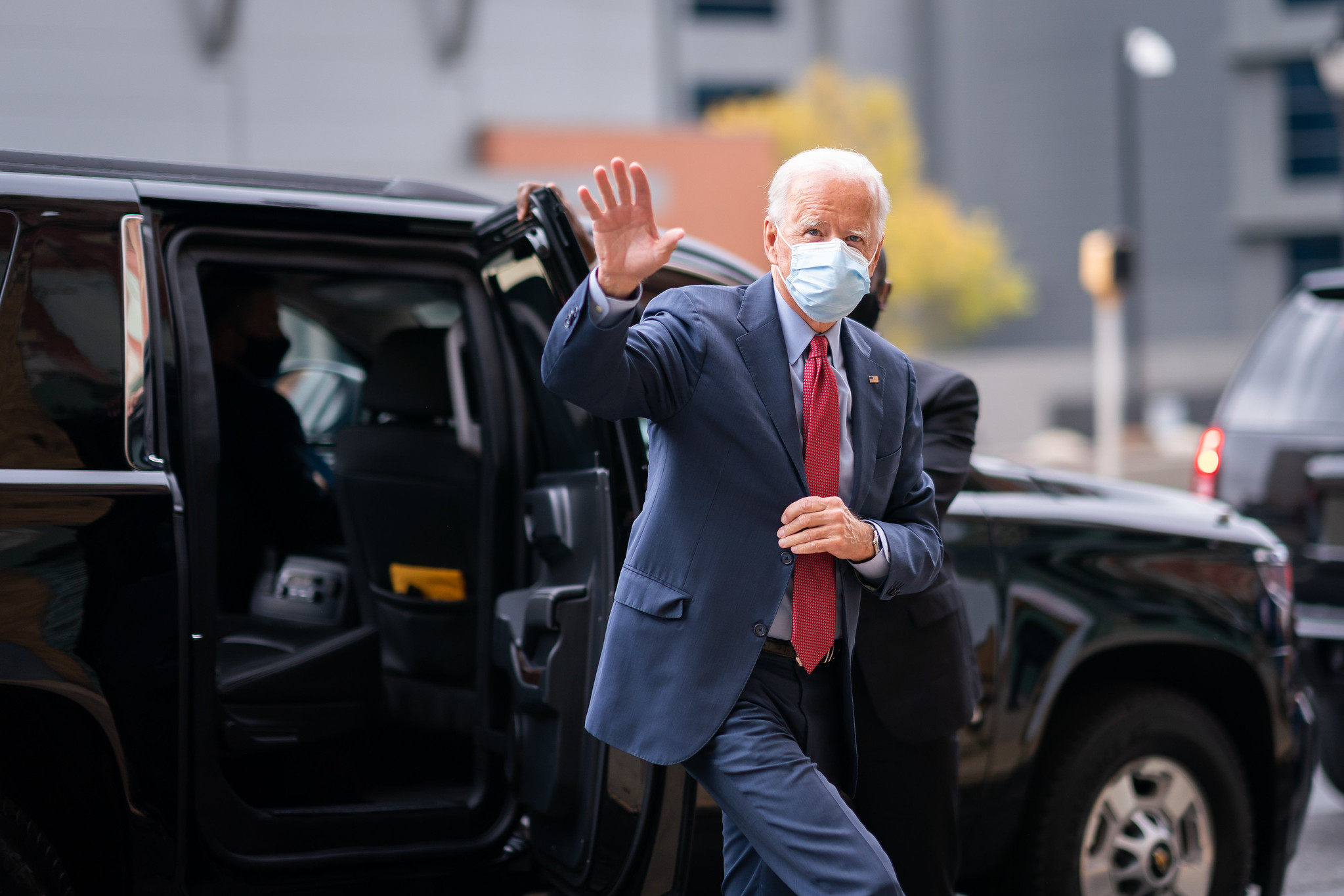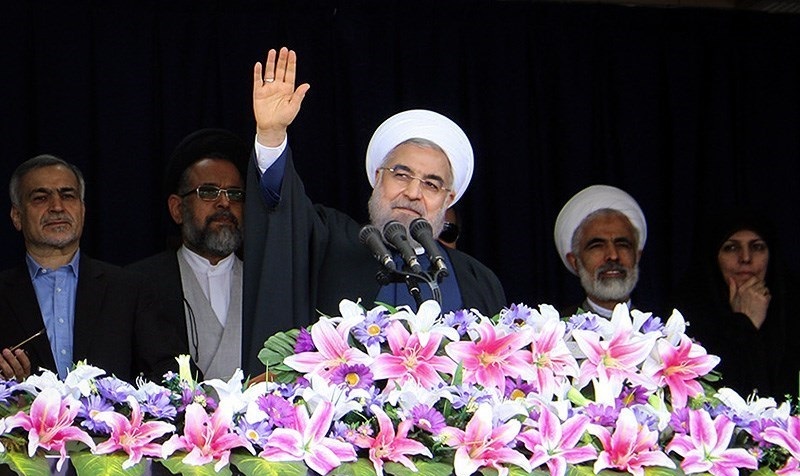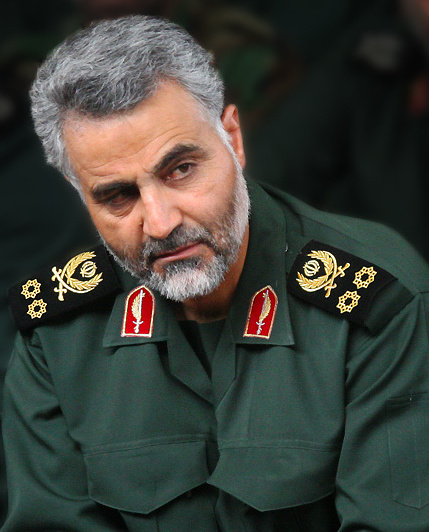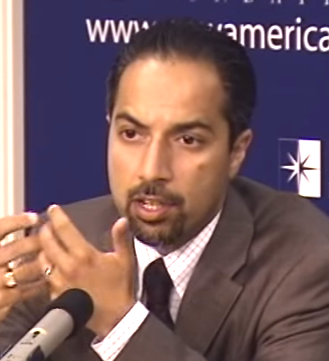With an eye on a U.S. return to “international agreements and norms” Iranian leaders have cautiously welcomed the Democrat’s victory.

Joe Biden on Oct. 28, 2020. (Adam Schultz/Joe Biden, Flickr, CC BY-NC-SA 2.0)
By Jessica Corbett
Common Dreams
 While President Donald Trump and his allies in Washington continue to ignore and reject the results of last week’s election, President-elect Joe Biden signaled on Tuesday that his administration may shift away from the Trump White House’s “maximum pressure” campaign against Iran in favor of easing tensions with the Middle Eastern nation’s government.
While President Donald Trump and his allies in Washington continue to ignore and reject the results of last week’s election, President-elect Joe Biden signaled on Tuesday that his administration may shift away from the Trump White House’s “maximum pressure” campaign against Iran in favor of easing tensions with the Middle Eastern nation’s government.
Biden spoke with U.K. Prime Minister Boris Johnson and French President Emmanuel Macron on Tuesday — though, as Washington Post reporter Matt Viser noted, those calls were not coordinated by the U.S. State Department because the General Services Administration, headed by Trump appointee Emily Murphy, has refused to allow the federal government to begin the Biden transition.
During his conversation with Macron, the U.S. president-elect “expressed his readiness to work together on global challenges, including security and development in Africa, the conflicts in Ukraine and Syria, and Iran’s nuclear program,” Biden’s transition team said in a press release emailed to Newsweek.

Iranian President Hassan Rouhani during a visit of Semnan Province, 2016. (Tasnim News Agency, CC BY 4.0, Wikimedia Commons)
Both France and the U.K. — along with Germany, Russia, China, and the European Union — remain supporters of the Iran nuclear deal that Trump ditched in 2018. Negotiated under President Barack Obama’s administration, in which Biden served as vice president, the deal is officially known as the Joint Comprehensive Plan of Action (JCPOA).
The Financial Times had reported earlier Tuesday:
“Mr. Biden has said he will return to the multi-party 2015 deal that limited Iran’s nuclear program, as long as Iran also returns to strict compliance, as a “starting point for follow-on negotiations.” But while the president-elect has promised to offer Iran “a credible path back to diplomacy,” the task is fraught with complexity and Biden advisers are playing down expectations of a deal.”
While analysts say the multi-party deal could be resurrected, it is a less straightforward undertaking than rejoining other multilateral forums ditched by Trump, including the Paris climate accord and the World Health Organization.
If the U.S. raises issues such as Iranian ballistic missiles or its support for militias in the region — which did not feature as part of the original deal — or Tehran demands compensation for U.S. withdrawal from the accord, then the talks immediately become more difficult.
Devastating Sanctions

Qasem Soleimani, the late commander of the Quds Force of the Iranian Revolutionary Guards (Wikimedia Commons)
The current administration’s withdrawal from the JCPOA has been followed by the imposition of devastating economic sanctions on Iran, along with other moves that have heightened fears of war, such as the U.S. military harassing a civilian plane over Syrian airspace and Trump ordering the assassination of Iranian Gen. Qasem Soleimani in January, which a top UN expert has determined was a violation of international law.
In addition to playing a key role in the Trump administration’s campaign against Iran, U.S. Secretary of State Mike Pompeo is now abetting Trump’s attempt to cling to power, even though major news outlets called the Nov. 3 presidential contest for Biden over the weekend. Pompeo made the “astounding and tyrannical” claim on Tuesday that “there will be a smooth transition to a second Trump administration.”
Amid the weekend declarations of the former vice president as the victor, Axios reported Sunday that Israeli sources said that “the Trump administration, in coordination with Israel and several Gulf states, is pushing a plan to slap a long string of new sanctions on Iran in the 10 weeks left until” Biden’s inauguration on Jan. 20.
According to Axios‘ Barak Ravid, who is based in Tel-Aviv, “The Trump administration’s envoy for Iran Elliott Abrams arrived in Israel on Sunday and met Prime Minister [Benjamin] Netanyahu and National Security Adviser Meir Ben-Shabbat to discuss the sanctions plan.”
Jamal Abdi, head of the U.S.-based National Iranian American Council (NIAC), declared on Twitter Monday that the forthcoming sanctions “are designed to box us in.”
In response to reporting on the “flood” of sanctions, Trita Parsi — a NIAC co-founder, current executive vice president of the Quincy Institute for Responsible Statecraft, and author of Losing an Enemy: Obama, Iran, and the Triumph of Diplomacy — urged Biden to go even bolder than Obama did.
“The Trump team apparently hopes that Biden will not wish to incur the political cost of backtracking on these sanctions, which will be tied to non-nuclear concerns such as ballistic missiles and human rights,” Parsi wrote for Foreign Affairs on Tuesday.
“But the transparent sabotage actually only sharpens Biden’s choices and may force him to go bigger than just restoring the agreement,” he continued. “Contrary to the calculations of the Trump administration and its allies in Israel, Biden may now seek not only to rejoin the nuclear deal but also to improve relations with Iran in order to insulate the agreement from Saudi, Emirati, and Israeli efforts to kill it.”
As Parsi put it:
Trita Parsi. (New America, CC BY 3.0, Wikimedia Commons)
“Rather than allowing Trump to force his hand, President-elect Biden should take the opportunity to think bigger, even, than the Obama administration was able to. Instead of asking himself what degree of sanctions relief he is willing to fight for in Congress to revive the nuclear agreement, he should ask himself what kind of relationship the United States would like to have with Iran in this century. If being trapped in unending enmity no longer serves U.S. interests, but instead makes the country less safe at a time when the public wants an end to wars and a withdrawal of forces from the Middle East, then Biden should outwit Trump just as Obama outsmarted Netanyahu and think beyond the nuclear deal. For instance, direct diplomatic ties with Iran could help the United States avoid conflict in the region and allow it to more effectively influence Iranian policies that it finds problematic. Biden could clearly signal that beyond the nuclear deal, he is open to normalizing relations with Tehran.”
Iranian leaders, meanwhile, have cautiously welcomed Biden’s victory. Citing the state-run IRNA news agency, the Washington Post reported on Iranian President Hassan Rouhani’s suggestion that there may be hope for the nuclear deal.
“Now, an opportunity has come up for the next U.S. administration to compensate for past mistakes and return to the path of complying with international agreements through respect of international norms,” Rouhani said on Sunday.
Iranian Foreign Minister Mohammad Javad Zarif weighed in on the U.S. election results in a tweet Sunday, writing that “the world is watching whether the new leaders will abandon disastrous lawless bullying of outgoing regime — and accept multilateralism, cooperation, and respect for law.”
Jessica Corbett is a staff writer for Common Dreams. Follow her on Twitter: @corbett_jessica.
This article is from Common Dreams.
Please Contribute to Consortium News
Donate securely with
Click on ‘Return to PayPal’ here.
Or securely by credit card or check by clicking the red button:




> During his conversation with Macron, the U.S. president-elect “expressed his readiness to work together on global challenges,
> including security and development in Africa, the conflicts in Ukraine and Syria, and Iran’s nuclear program,”
It seems entirely credible to me that the incoming Administration would want to work with Macron on these issues — but that is in no way an indication that they will work for peace, the rule of law in international affairs, or we, the people’s welfare!
Modern American behavior, least of all that of the Trump administration, clearly show that America seldom respects Third World countries that remain militarily weak. Even having an American sponsored dictator at the helm, being from the capitalist camp and even being a non-Muslim state are not sufficient qualities to keep trigger-happy American troops away from their shores, as the cases of Panama and Grenada prove beyond any doubt.
Iranian leaders should note these points and wisely hedge themselves by following the sensible models set by North Korea and Pakistan and stream right ahead in developing a credible, if also covert, military nuclear program even while keeping to an internationally verifiable civilian nuclear power program.
Yes this alone would put the prospective Biden administration’s claim of wanting to upend and reverse all Trumpian policies, including presumably the JCPOA, to a rigourous test. Iran has nothing to lose in this regard, Biden and company are also committed Israeli lap dogs, if they could swollow Israel’s covert nuclear weapons program without even a whimper they should be able to do the same with Iran’s purely defensive ones too !
Considering that Iran keeps to international law, has attacked no other country and is acting under the rules of the IAEA concerning nukes, while the USA does the opposite, the behavior of Biden so far shows supreme arrogance and resistance to peaceful relationships with an important sovereign nation which has done no harm to the USA.
I’d bet a million dollars that Biden will seek to “renegotiate” instead of re-entering. And with non-starter ballistic missile demands as noted in the article. So, the deal is dead as far as the US goes. It’s wishful thinking imo to pretend otherwise. The other parties should get serious about fulfilling their obligations to Iran, and Iran should of course do the same.
Also–If I were Iran I’d insist on immediate lifting of all sanctions; some form of compensation; and most importantly, for the US to re-enter it Congress needs to make it an actual treaty, and include massive penalties to the US for breaching it, or withdrawing on a whim.
Iran would be beyond stupid to allow the “non-agreement capable” rogue US regime to once again back the treaty with little more than executive orders. Even if a Biden Admin wouldn’t subsequently break the terms itself, obviously in four years a new Prez could simply pull another Trump.
Also, if I were Iran I’d have done my best to start a secret nuke program. As Libya showed, promises kept of no nukes lead to your leaders sodomized and murdered in the street; as opposed to Pakistan, who were sanctioned but managed to develop nukes, then just a few years later made billions by being a staging locale for the Afghanistan invasion. For most countries under threat of US regime change or direct war slaughter, it’s irrational NOT to attempt to covertly make or acquire nukes.